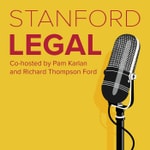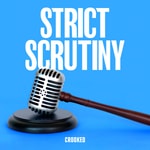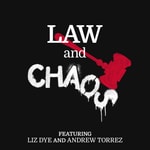Stanford Legal – Details, episodes & analysis
Podcast details
Technical and general information from the podcast's RSS feed.

Stanford Legal
Stanford Law School
Frequency: 1 episode/16d. Total Eps: 170

Recent rankings
Latest chart positions across Apple Podcasts and Spotify rankings.
Apple Podcasts
🇺🇸 USA - government
02/08/2025#89🇺🇸 USA - government
01/08/2025#59🇺🇸 USA - government
31/07/2025#97🇺🇸 USA - government
30/07/2025#82🇺🇸 USA - government
29/07/2025#63🇺🇸 USA - government
28/07/2025#60🇨🇦 Canada - government
27/07/2025#98🇺🇸 USA - government
27/07/2025#74🇨🇦 Canada - government
26/07/2025#83🇺🇸 USA - government
26/07/2025#89
Spotify
No recent rankings available
Shared links between episodes and podcasts
Links found in episode descriptions and other podcasts that share them.
See all- https://twitter.com/our_ford
48 shares
- https://twitter.com/stanfordlaw
48 shares
- https://twitter.com/@stanfordlawmag
48 shares
RSS feed quality and score
Technical evaluation of the podcast's RSS feed quality and structure.
See allScore global : 59%
Publication history
Monthly episode publishing history over the past years.
Election Stress Test: Can America's Electoral System Weather 2024?
Episode 143
jeudi 12 septembre 2024 • Duration 26:52
As the 2024 presidential election approaches, Nate Persily forecasts complications along with it.
Persily, a Stanford law professor and a leading expert in election law and administration, says the coming election cycle could pose unprecedented challenges for voters and election officials alike. “We are at a stage right now where there's a lot of anxiety about election administration,” he says. “There's a significant share of the population that's completely lost confidence in our system of elections.”
With nearly every state having altered its election laws since 2020 and a significant turnover in election administrators, Persily says the stage is set for a potentially bumpy ride this November. As voter confusion and AI-powered disinformation loom overhead, Persily says the integrity of our democracy may well depend on our collective ability to weather this less-than-perfect storm.
Connect:
- Episode Transcripts >>> Stanford Legal Podcast Website
- Stanford Legal Podcast >>> LinkedIn Page
- Rich Ford >>> Twitter/X
- Pam Karlan >>> Stanford Law School Page
- Stanford Law School >>> Twitter/X
- Stanford Law Magazine >>> Twitter/X
Links:
- Nate Persily >>> Stanford Law School Page
Nate Persily outlines the primary concerns for the upcoming election, including voter confusion, changes in election laws, and the pressures faced by election officials.
(00:03:27) Chapter 2: Decentralization and Election AdministrationThe panel discusses the challenges of managing a national election run by numerous local jurisdictions, including issues with certification and varying local procedures.
(00:05:44) Chapter 3: The Evolving Election TimelinePersily, Karlan, and Ford explore how election day has expanded into an extended voting period, covering early and mail-in voting, and the implications for counting and certification.
(00:17:41) Chapter 4: Technology, Disinformation, and Media InfluenceExamines the impact of technology and disinformation, including deep fakes and misinformation about voting procedures, and their effects on public trust.
(00:23:37) Chapter 5: Building Confidence in the Electoral ProcessPersily discusses strategies to bolster confidence in the election process, emphasizing support for election officials and the role of local leaders in maintaining trust.
High Court, High Stakes: The Massive Weight of Recent Supreme Court Rulings
Episode 142
jeudi 29 août 2024 • Duration 39:51
The Supreme Court's latest term was marked by decisions of enormous consequence. However, the way the Court has communicated about these rulings far undersells the gravity they carry.
While “expressing itself in extremely modest terms,” Professor Jeffrey Fisher says, the current Supreme Court has “[handed] down decisions that have enormously consequential effects for our democracy, people's rights, and everything in between.” He and Assistant Professor Easha Anand, co-directors of the Supreme Court Litigation Clinic, agree that these recent decisions could reshape American law and politics for years to come.
In this episode of Stanford Legal with host Pam Karlan, Fisher, and Anand take a critical look at recent Supreme Court rulings on abortion, gun rights, tech platforms, and the power of federal agencies, examining the Court's evolving approach and considering the potential long-term impacts on American democracy and the rule of law.
Connect:
- Episode Transcripts >>> Stanford Legal Podcast Website
- Stanford Legal Podcast >>> LinkedIn Page
- Rich Ford >>> Twitter/X
- Pam Karlan >>> Stanford Law School Page
- Stanford Law School >>> Twitter/X
- Stanford Law Magazine >>> Twitter/X
Links:
- Jeff Fisher >>> Stanford Law School Page
- Easha Anand >>> Stanford Law School Page
- Stanford Supreme Court Litigation Clinic >>> Stanford Law School Page
(00:00:00) Chapter 1: Introduction to the Supreme Court Term and Key Cases
Pam Karlan is joined by Professors Jeff Fisher and Easha Anand to discuss the past term at the Supreme Court, constitutional law and Supreme Court practice, highlighting key cases and themes from the term. They explore how the court's conservative majority shapes the docket and the role of Justices Barrett and Jackson in developing their judicial voices.
(00:06:56) Chapter 2: High-Profile Cases: Guns, Abortion, and Administrative Law
Examine major cases, including gun rights in Rahimi v. United States and Cargill v. Garland, abortion-related cases, and the pivotal Loper Bright decision affecting the administrative state. They analyze the court's reasoning and the broader implications of these rulings.
(00:15:28) Chapter 3: The Court's Evolving Role and Methodology
Discussion of the broader implications of the Supreme Court's evolving approach to its docket and decision-making processes, particularly in relation to the administrative state and the impact of recent rulings on future cases.
(00:19:14) Chapter 4: The Supreme Court and Technology Cases
They delve into the significant technology cases that were brought before the Supreme Court this term. They discuss how the Court addressed state laws from Florida and Texas aimed at restricting content moderation by big tech companies, marking the first time the First Amendment was applied to social media platforms. The discussion highlights the tension between traditional legal frameworks and the evolving digital landscape, with a focus on the implications of these rulings for the future of free speech online.
(00:24:10) Chapter 5: Trump and the Supreme Court: Balancing Power and Immunity
The group explores the complex legal landscape surrounding former President Donald Trump's involvement in Supreme Court cases. Easha Anand provides an in-depth analysis of the Trump v. United States case, where the Court examined the extent of presidential immunity concerning acts related to the 2020 election. The discussion also touches on the broader implications of the Court's rulings on Trump’s legal challenges, including how these decisions might shape future presidential conduct and accountability.
(00:29:27) Chapter 6: Supreme Court’s Role in Protecting Democracy
Pam Karlan and Jeff Fisher discuss the Supreme Court's role in safeguarding democratic processes. They analyze the Court's reluctance to engage deeply in political matters, such as the January 6th prosecution and political gerrymandering, highlighting the tension between judicial restraint and the need to protect democratic values. The chapter concludes with reflections on the broader implications of these decisions for the future of U.S. democracy, particularly in the context of voting rights and election integrity.
AI in Government and Governing AI: A Discussion with Stanford’s RegLab
Episode 133
jeudi 25 avril 2024 • Duration 32:07
Joining Pam and Rich for this discussion are Professor Daniel Ho and RegLab Fellow Christie Lawrence, JD ’24 (MPP, Harvard Kennedy School of Government).
Dan is the founding director of Stanford’s RegLab (Regulation, Evaluation, and Governance Lab), which builds high-impact partnerships for data science and responsible AI in the public sector. The RegLab has an extensive track record partnering with government agencies like the Environmental Protection Agency, Internal Revenue Service, the U.S. Department of Labor, and Santa Clara County on prototyping and evaluating AI tools to make government more fair, efficient, and transparent. Building on this work, the RegLab also helps agencies strengthen AI governance and operationalize trustworthy AI principles.
Christie, a third-year JD student, worked with RegLab and Stanford’s Innovation Clinic on projects to advise DOL on responsible AI and development practices and to support the work with Prof. Ho on the National AI Advisory Committee, which advises the White House on AI policy. In this interview, we’ll learn about several RegLab projects—and the importance of helping government develop smart AI policy and solutions.
Connect:
- Episode Transcripts >>> Stanford Legal Podcast Website
- Stanford Legal Podcast >>> LinkedIn Page
- Rich Ford >>> Twitter/X
- Pam Karlan >>> Stanford Law School Page
- Stanford Law School >>> Twitter/X
- Stanford Law Magazine >>> Twitter/X
Links:
- Dan Ho >>> Stanford Law School web page
[00:00:00] Chapter 1: Setting the Stage
- Mention of the rapid acceleration of technology and the release of ChatGPT.
- Highlighting the risks associated with AI, such as bias and privacy concerns.
- Discussion on the relationship between AI and governance, including recent developments in AI policy and governance.
- Mention of the Biden administration's executive order on AI and its implications.
[00:03:04] Chapter 2: The Role of Reg Lab and Collaboration with the IRS
- Explanation of the Reg Lab and its purpose.
- Discussion on the need for government agencies to modernize their technology infrastructure.
- Overview of the collaboration with the IRS to improve tax evasion detection using machine learning.
- Discovery of disparities in auditing rates and subsequent IRS reforms.
- Highlighting the intersection of AI, social justice, and government practices.
[00:09:12] Chapter 3: Student Perspective
- Christie Lawrence shares her experience working on AI policy at Stanford Law School.
- Discussion on bridging the gap between policy, law, and technology.
- Impactful work done by students in collaboration with government agencies.
[00:11:38] Chapter 4: AI and Social Justice
- Pam Karlan's experience with AI issues in the Justice Department's Civil Rights Division.
- Examples of algorithmic discrimination and its implications for social justice.
- Discussion on the challenges of addressing AI-related issues in government practices.
[00:23:55] Chapter 5: Future Directions
- Optimism about the future of AI governance and the recent executive order's impact.
- Anticipation of legislative proposals and state-level initiatives in AI regulation.
- Importance of maintaining an open innovation ecosystem and addressing talent gaps in government agencies.
[00:25:55] Chapter 6: Audience Questions
Race, Class, and College Admissions with Rick Banks
Episode 46
dimanche 14 avril 2019 • Duration 28:33
Chinese State-Owned Enterprises with Curtis Milhaupt
Episode 45
mardi 19 février 2019 • Duration 27:39
Gene-edited Babies and DNA Testing with Hank Greely
Episode 44
mardi 19 février 2019 • Duration 28:33
A Conversation with ACLU Staff Attorney Katrina Eiland, JD '10
Episode 43
dimanche 3 février 2019 • Duration 28:25
Gerrymandering and the 2020 Census with Nate Persily
Episode 42
samedi 2 février 2019 • Duration 27:35
Climate Change Dilemma with Professor Thomas Heller
Episode 41
mardi 22 janvier 2019 • Duration 27:42
Natural Disasters and Climate Change with Buzz Thompson
Episode 40
mardi 22 janvier 2019 • Duration 28:19








